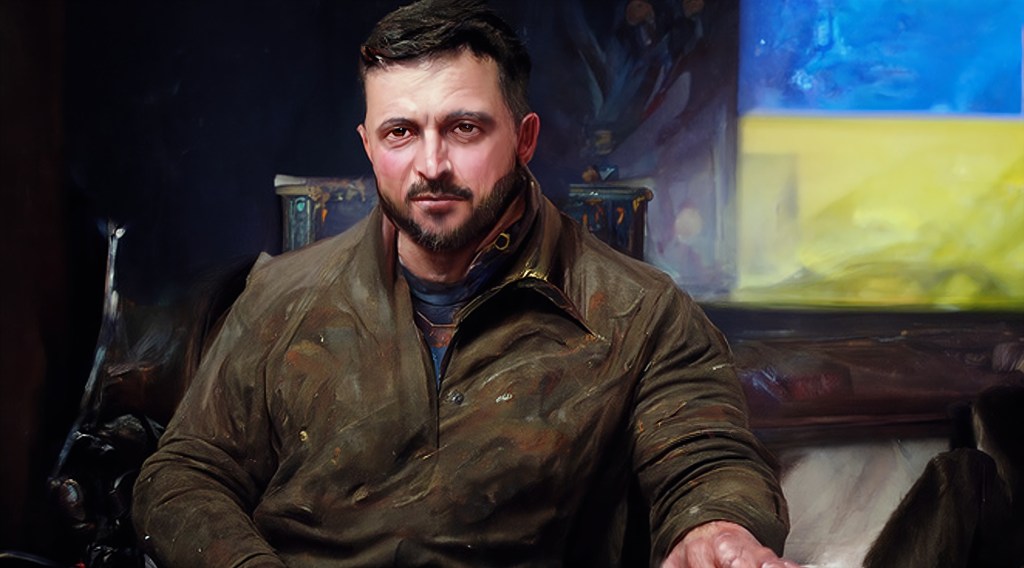A Ukrainian deep tech startup is launching a charity NFT project to sell AI-generated artworks with the twin goal of raising money to support people affected by Russia’s war of aggression and also — it hopes — keep attention locked on the conflict as it approaches its fourth month, with many in the country concerned that the world’s focus is flagging.
The collection of AI-generated “artworks” depict different events, moments and people that have featured in the war — including much reported events such as the attack on Snake Island or the Russian ‘Moskva’ cruiser on fire. There are also more general scenes from the war on show, such as scenes of locals sheltering in subways or the shelling of Ukrainian cities.
Another of the artworks (pictured above) is a portrait of Ukraine’s indefatigable president Zelenskyy — accompanied by a text description recalling his refusal to leave the country soon after Russia invaded and his request that the West send weapons instead.
The generative artworks have all been rendered in a heroic, oil painterly style by the startup’s AI software.
The Sirens Gallery, as the project is named, is showcasing more of the collection — which will comprise close to 2,000 artworks in total — on its website.
The team behind the project hails from a game development-focused startup, called ZibraAI, which has most of its staff based inside Ukraine. They’ve drawn on their expertise in machine learning and content generation technologies to create a neural network pipeline that generates art from text descriptions, as COO Roman Mogylnyi — who is also a co-founder (and former CEO) of the AI face-swap app, Reface — tells it.
The AI tech is operating in the same ballpark as OpenAI’s DALL-E transformer language model — which has been grabbing online attention in recent months as web users have been able to plug in their own text prompts to get almost instant (but typically hit and miss) illustrations on-demand.
Albeit, in this case the AI model was trained on imagery from the Ukraine war — including, by the looks of it, this iconic photo of a soldier standing in a ray of light inside the Azovstal steelworks in Mariupol, among others.

“We created the whole tech and we fine-tuned it a little bit on the pictures from the war,” confirms Mogylnyi, who says their first focus was on making the model’s output “look like artworks.” “It was fine-tuned for the events of the war because if you just type in some events from Mariupol in general, usual neural networks won’t do that. So that’s why some images may seem familiar … because they were in a fine-tuning dataset.”
“We looked at different approaches … but we always make our own technologies,” he also tells TechCrunch, discussing how similar the tech is compared to other transformer language models. “It has text inputs that you type in and then you get the artwork. Also much work was done because it took quite a lot of time to make it look like real artworks — and in a good way.”
The style of the artworks intentionally evokes a heroic (or, well, tragic-heroic) look. And the use of AI to automate production of such works could end up opening a new chapter in the history of war propaganda art, depending on how impactful this sort of material proves to be.
“We wanted to praise the courage of the people of Ukraine who are doing different stuff from volunteering to fighting,” confirms Mogylnyi, adding: “We cherry-picked the events.”
He also says the team engaged in plenty of human curation — saying they probably generated between 3x and 4x more images in total to narrow the Sirens collection down to a total of 1,991 images that will be put up for sale as NFTs (aka, non-fungible tokens or, more basically, digital collectables), starting from Friday — with the goal of raising up to $2 million for their two chosen local charities. (The starting price per NFT will be $100.)
The two Ukrainian charities the team has chosen to support are Dobro.ua, which is focused on providing assistance to children in hospitals during the war; and Unchain.fund — a “crypto-native” charity organization which says it aims to provide timely humanitarian assistance to Ukrainians affected by the war such as by sending cash assistance payments to mothers direct to a mobile wallet.
The charities’ crypto wallets have been integrated into a smart contract of the Sirens NFT sales — meaning the money raised should be transferred to them directly on completion of the sales. “By purchasing Sirens Gallery NFTs, buyers are directly helping to rescue children and adults that are suffering from the war in Ukraine and are forced to remain in danger,” the team adds.
The first drop of 661 NFT artworks will take place this Friday on OpenSea, followed by another two drops of a similar amount of NFTs in the coming weeks.
Asked why the team decided to sell the AI-generated war artworks as NFTs — which demands a certain level of crypto-savvy among buyers (potentially restricting the pool of people who are able to support the project) — Mogylnyi responds by emphasizing Ukraine’s “technology spirit” which he says is driving its eager embrace of web3 technologies.
He also points to how much cryptocurrency the Ukrainian government has been able to raise to support war efforts and for humanitarian needs by making appeals for crypto donations — further noting the country’s Ministry of Digital transformation is an official backer of the Sirens Project so will also be showcasing the NFTs for sale. “They have a link on their website where they show the NFT collections that they support that are raising money for donation for Ukraine.”
Ukraine deputy minister talks IT Army and deploying $25M in donated crypto
Ukraine’s Mykhailo Fedorov talks about corporate sanctions and running a government during wartime































Comment